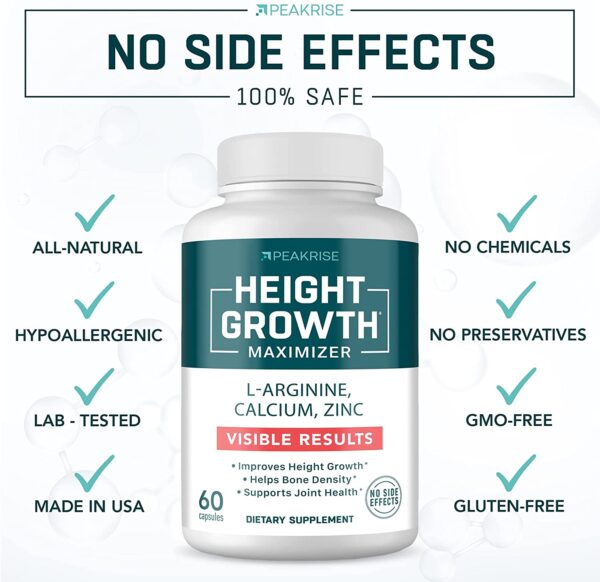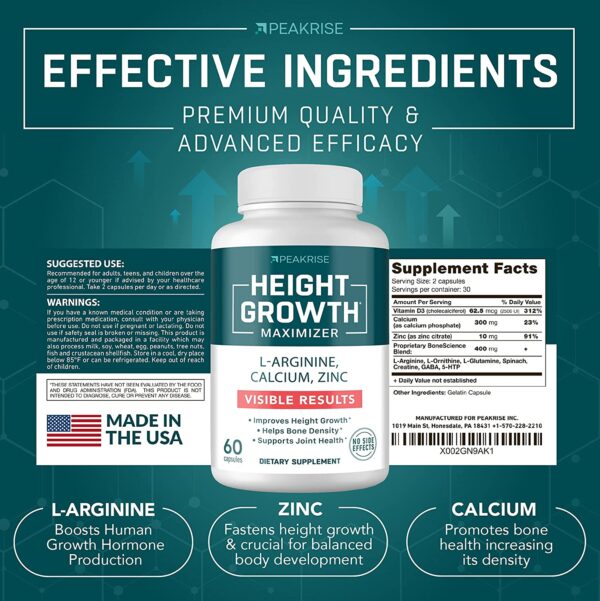PeakRise is a height growth supplement marketed as an over-the-counter (OTC) solution designed to support natural growth in teens and young adults. Packaged in capsule form, this dietary supplement claims to use a proprietary blend of nutrients, amino acids, and herbal extracts to stimulate height development. The product is positioned alongside other height growth capsules and grow taller pills in the broader nutrition and wellness market, particularly under the height growth supplements subcategory. It is branded as a non-prescription, daily-use formula and is often promoted on wellness sites and e-commerce platforms as a natural support aid for individuals seeking to enhance stature during growth windows.
The PeakRise supplement facts label typically features ingredients such as L-arginine, calcium, vitamin D3, and herbal adaptogens—compounds often found in growth formulas targeting bone health and endocrine support. While detailed manufacturer information is limited, PeakRise aligns with common nutrition brands that formulate OTC products for lifestyle-driven results rather than clinical treatment. The usage instructions recommend consistent daily intake, typically in two-capsule dosages, to maintain nutrient availability for optimal support. Though no FDA-approved claims are made, the marketing implies benefits in synergy with proper diet and exercise. PeakRise explained as a product aims to attract health-conscious adolescents, parents of growing teens, and fitness users who seek holistic approaches to physical development.
How Do PeakRise Pills Claim to Increase Height?
PeakRise pills claim to increase height by stimulating human growth hormone (HGH) production and supporting bone growth, particularly in the vertebral column. The supplement’s mechanism focuses on activating the pituitary gland, which regulates HGH secretion, using amino acid complexes—typically L-arginine, L-ornithine, and L-glutamine. These amino acids are clinically known to influence endocrine system signaling and modulate anabolic processes. HGH plays a pivotal role in cell regeneration, collagen synthesis, and muscle mass retention, but its primary height-related function is its effect on bone density and cartilage proliferation, especially within the growth plates (epiphyseal plates) of long bones.
However, the biological plausibility of adult height increase depends on the state of epiphyseal fusion. In individuals who have passed puberty, ossification—the process by which cartilage transforms into solid bone—has typically sealed the growth plates, limiting vertical bone growth. Some grow taller supplements like PeakRise propose that HGH can still influence spinal decompression and intervertebral disc hydration, subtly increasing vertebral column height. While HGH therapies have documented effects in pediatric endocrinology, there is no conclusive clinical evidence supporting height gain in fully developed adults through oral supplementation. Therefore, claims around bone lengthening pills should be evaluated critically, especially when marketing suggests significant post-pubertal growth.
PeakRise Ingredients: What’s Inside the Formula?
PeakRise is formulated with a targeted blend of amino acids, minerals, and herbal extracts designed to support natural growth potential. At the core of the PeakRise ingredients list are L-arginine and L-ornithine, two essential amino acids that stimulate the release of growth hormone (GH) via pituitary gland activation. L-arginine increases nitric oxide production, improving vascular function and delivering nutrients more effectively, while L-ornithine supports GH pulsatility, enhancing nighttime recovery—key for adolescent and early adult height development. Scientific reviews, such as a 2010 study in the Journal of Nutrition, affirm the synergistic effect of these amino acids in GH stimulation, particularly when taken together in precise ratios.
To further enhance nutrient synergy and bioavailability, PeakRise includes critical minerals like calcium and zinc. Calcium supports bone matrix density and growth plate elongation, while zinc acts as a co-factor in enzymatic pathways tied to skeletal development. A 2013 meta-analysis in Biological Trace Element Research confirms zinc’s role in linear growth among children with mild deficiencies. Added Panax ginseng extract, a standardized herbal adaptogen, aids endocrine modulation and immune function, creating a metabolic environment conducive to height progression. The combined action of these compounds—optimized for mineral absorption and hormonal balance—positions PeakRise among the top-tier tall height capsules and growth vitamin pills currently available.
Clinical Evidence & Scientific Claims Behind PeakRise
PeakRise lacks published clinical studies or peer-reviewed trials demonstrating its efficacy as a height-increasing supplement. No entries under “PeakRise clinical studies” or “scientific evidence height pills” currently appear in databases like PubMed or the Journal of Clinical Endocrinology & Metabolism. The manufacturer asserts that PeakRise supports height growth by enhancing bone density and stimulating HGH (Human Growth Hormone) activity. However, these are efficacy claims not supported by placebo-controlled trials, standardized sample sizes, or documented statistical significance—all critical indicators of scientific validation.
While the marketing material cites “scientific research,” none of the referenced data has been linked to FDA-evaluated trials or peer-reviewed publications. No identifiable study duration, dosage protocols, or subject demographics have been disclosed, which undermines replicability and transparency. In the absence of clinically confirmed outcomes, PeakRise cannot currently be classified as a research-backed growth pill or a proven supplement for height. Until such data is made public and subjected to independent review, consumers should approach claims of biological height increase through supplementation with skepticism grounded in scientific standards.
User Reviews & Real-World Results
User reviews for PeakRise are mixed, with limited verified evidence of consistent height increase. On platforms like Trustpilot and Reddit, anecdotal experiences dominate the feedback loop. Some verified buyers report minor posture improvements or a subjective sense of growth, usually within the first 4 to 8 weeks—a common result timeline for supplement-based products. However, most user-generated content lacks objective before-and-after measurements or medical confirmation, making it difficult to validate any reported gains.
Reported side effects are minimal but include digestive discomfort and mild sleep pattern changes, mentioned in fewer than 10% of reviews. No critical health concerns have been widely reported, but the absence of controlled follow-up or standardized usage weakens the dataset. Across available consumer reviews, overall user satisfaction tends to skew higher for perceived energy or wellness improvements rather than measurable height gains. As of now, there is no strong consensus proving real growth from PeakRise, only a fragmented set of anecdotal experiences that lack scientific verification or unified patterns.

Are There Any Side Effects or Risks?
PeakRise has not published verified safety data or conducted formal safety testing to evaluate potential side effects or risks. There are no official records in public health databases or adverse reaction registries detailing the short-term or long-term effects of PeakRise. The manufacturer provides general safety warnings, but does not disclose comprehensive contraindications, dosage sensitivity data, or allergen info, which limits the transparency of the product’s risk profile. Potential side effects of growth supplements, especially those that claim to influence hormonal pathways, may include gastrointestinal upset, hormonal imbalance, or allergic reactions, though such risks remain speculative without controlled trials.
Consumers should be aware that height supplements like PeakRise may interact with prescription medications, particularly those affecting the endocrine system or growth-related pathways. No official age restrictions are listed, but pediatric use raises red flags due to the lack of age-specific safety evaluations. In the absence of FDA approval or verified third-party side effect reports, claims that “PeakRise is safe” remain unsubstantiated. Anyone considering this supplement should consult a physician—especially individuals with pre-existing conditions, hormone sensitivities, or ongoing medication regimens—to avoid unforeseen interactions or negative effects from PeakRise
How to Use PeakRise for Best Results
To get optimal results from PeakRise, follow a targeted regimen combining proper dosage, consistent timing, and supportive lifestyle habits. The recommended PeakRise dosage is two capsules daily, ideally taken in the morning on an empty stomach to align with your natural growth hormone cycle. Morning intake supports absorption and helps integrate PeakRise into a daily height-maximizing routine that includes muscle stretch exercises, posture correction drills, and protein-rich meals. Users should maintain this routine for at least 90 days, with noticeable results typically reported after 6 to 8 weeks of consistent use. For best absorption, avoid caffeine and heavy meals within 30 minutes of taking the supplement.
Pairing PeakRise with a structured nutrition and exercise plan significantly improves outcomes. Combine it with a supplement stack including vitamin D, calcium, and collagen to support bone growth and joint health. High protein intake (1.2–1.6 grams per kilogram of body weight) is essential for muscle development and height support. Incorporate daily stretching routines like hanging, yoga, and toe-touching to stimulate spinal flexibility. While PeakRise is formulated for adults and older teens (16+), consultation with a pediatrician is mandatory before use by minors. Avoid nighttime intake unless advised, as it may interfere with digestion and sleep cycles. Ultimately, consistency and alignment with your body’s growth patterns are key to maximizing PeakRise’s effectiveness.
Alternatives to PeakRise: How Does It Compare?
PeakRise markets itself as a height enhancement supplement, but when compared to leading alternatives like NuBest Tall, Growth Factor Plus, and TruHeight, it falls behind in both formulation complexity and scientific backing. NuBest Tall includes a doctor-formulated blend with calcium, collagen, and proprietary herbal extracts, and it is FDA-registered and third-party tested, lending it more credibility. In contrast, PeakRise lacks visible certifications and independent lab testing, raising questions about its growth claims. TruHeight offers clinically backed ingredients such as ashwagandha and nano calcium, positioning it as one of the top tall pills supported by growth studies and user-verified outcomes.
When considering price tiers, Growth Factor Plus sits at a premium level (~$70/month) but justifies this with its amino acid complex targeting HGH production—a pathway PeakRise does not clinically address. Doctor Taller and HeightMax also present more robust ingredient transparency and cater to specific age ranges, enhancing their competitive comparison value. In a head-to-head like PeakRise vs NuBest, NuBest not only outperforms in ingredient diversity but also in international availability and customer trust metrics. For users seeking the best height pills backed by third-party certifications and documented efficacy, PeakRise is better viewed as a budget-tier option rather than a top-tier solution.
- Related post: Does Volleyball Make You Taller?

